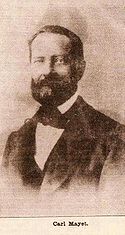Carl Mayet
Carl Mayet (born August 11, 1810 in Berlin ; † May 18, 1868 there ) was a German chess player .
Life
Mayet came from a Huguenot family . Until 1828 he was a student in the oldest still existing grammar school in Berlin, the grammar school zum Grauen Kloster , and then studied law in Berlin and Heidelberg. In addition to Ludwig Bledow , Paul Rudolf von Bilguer , Tassilo von Heydebrand and the Lasa and Wilhelm Hanstein (a cousin of Mayet), he was one of the leading master players in Berlin after 1836 and a member of the Berlin Siebengestirns . He contributed valuable opening analysis of the Spanish game to the first edition of the Bilguer handbook .
Mayet, counselor and later employed as a lawyer and notary at the Berlin City Court, was initially transferred to Potsdam and Stettin for a few years in 1840. In 1851 he married the daughter of the theologian Julius August Ludwig Wegscheider in Halle , with whom he had two daughters. When he returned to the Prussian capital, he was the last active player in the Seven Stars in the 1850s and thereafter. In addition to the competitions among the Berlin masters, he also competed against other leading chess players of his time, including a. - each in Berlin - against József Szén (1839 +2 = 1), Augustus Mongredien (1845 +3 = 1 −3), Daniel Harrwitz (around the turn of the year 1847/48 +2 = 2 −5) and Jean Dufresne (1853 + 5-7). Between 1850 and 1868 Mayet often played against Adolf Anderssen when he was passing through or visiting Berlin on vacation. When Anderssen stayed in Berlin for a few days in 1859, Mayet won "one game each in the two quickly fought bets of seven sweepstakes each", and in April 1865 he scored two wins and one draw in eight games.
Mayet took part in the chess tournament in London in 1851 (the first international chess tournament of modern times), but he lost in the first round to Hugh Alexander Kennedy and was eliminated. In 1853 he took part in the first club championship of the Berlin Chess Society and came third after Jean Dufresne and Max Lange .
The variant 1. e2 – e4 e7 – e5 2. f2 – f4 e5xf4 3. Ng1 – f3 g7 – g5 4. Bf1 – c4 Bf8 – g7 5. d2 – d4 d7 – d6 6. c2 – c3 in the King's Knight's Gambit is after him named.
literature
- Mario Ziegler: The Chess Tournament London 1851 . ChessCoach, St. Ingbert 2013. ISBN 978-3-944158-00-6 , pp. 98-101
Web links
- Replayable chess games by Carl Mayet on chessgames.com (English)
- Carl Mayet , obituary in the Neue Berliner Schachzeitung , 1868, p. 161
- The Mayet Gambit (PDF; English) on studimonetari.org
Individual evidence
- ↑ Life data according to the Schachzeitung , July 1, 1868, p. 197.
- ^ O. Koch: Karl Mayet. In: Deutsches Wochenschach 1908, pp. 121–127.
- ↑ Cf. Tassilo von Heydebrand and the Lasa, Berliner-Schach-Quellen (1859), p. 21 ff.
- ^ Nekrolog in: Neue Berliner Schachzeitung 1868, p. 161.
- ^ O. Koch: Karl Mayet , in: Deutsches Wochenschach 1908, p. 123.
- ^ O. Koch: Karl Mayet , in: Deutsches Wochenschach 1908, p. 123.
- ↑ Schachzeitung 1848, p. 95.
- ↑ Schachzeitung der Berliner Schachgesellschaft 1859, p. 192.
- ^ O. Koch: Karl Mayet , in: Deutsches Wochenschach 1908, p. 125.
| personal data | |
|---|---|
| SURNAME | Mayet, Carl |
| ALTERNATIVE NAMES | Mayet, Karl |
| BRIEF DESCRIPTION | German chess player |
| DATE OF BIRTH | August 11, 1810 |
| PLACE OF BIRTH | Berlin |
| DATE OF DEATH | May 18, 1868 |
| Place of death | Szczecin |
